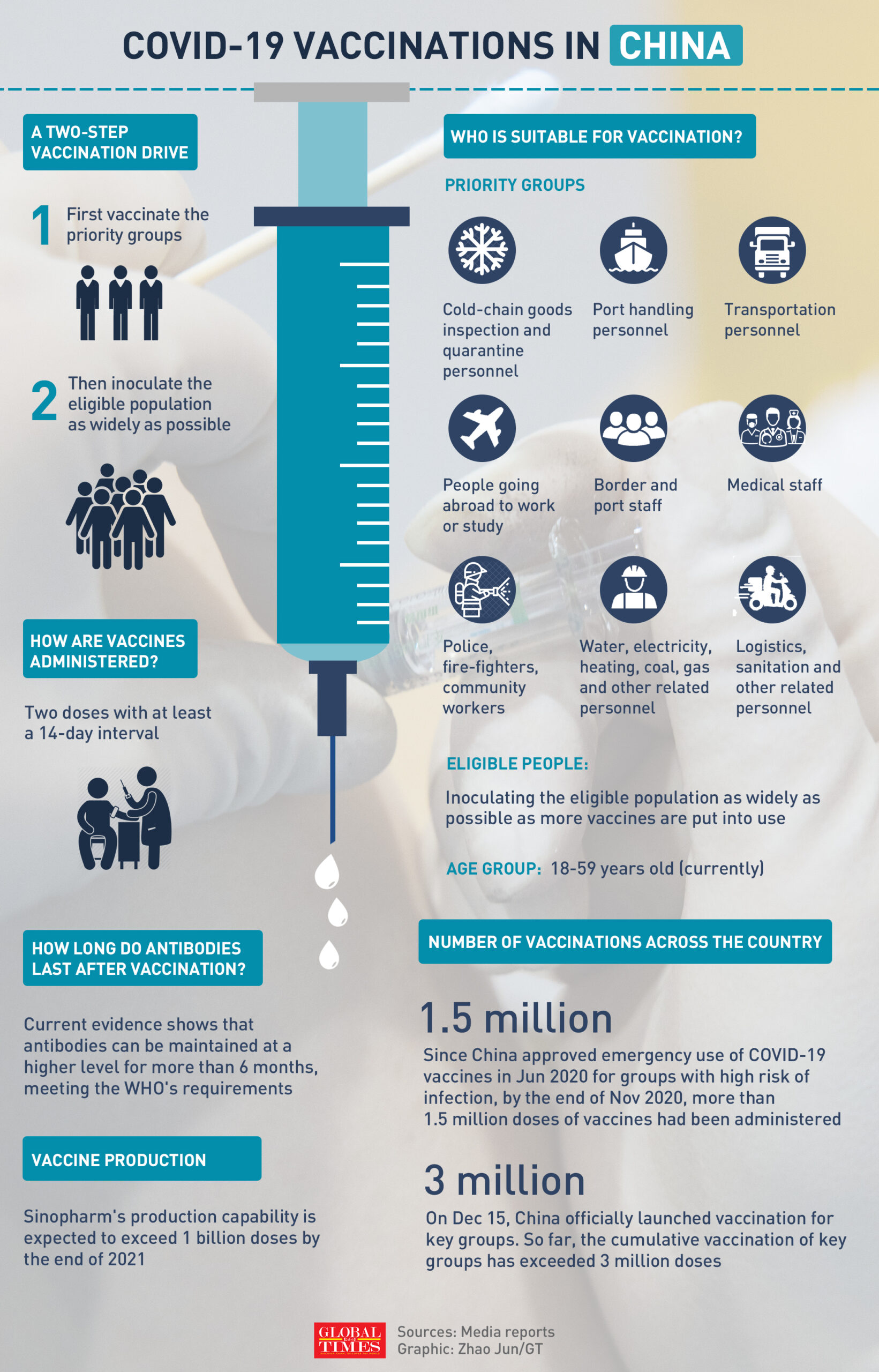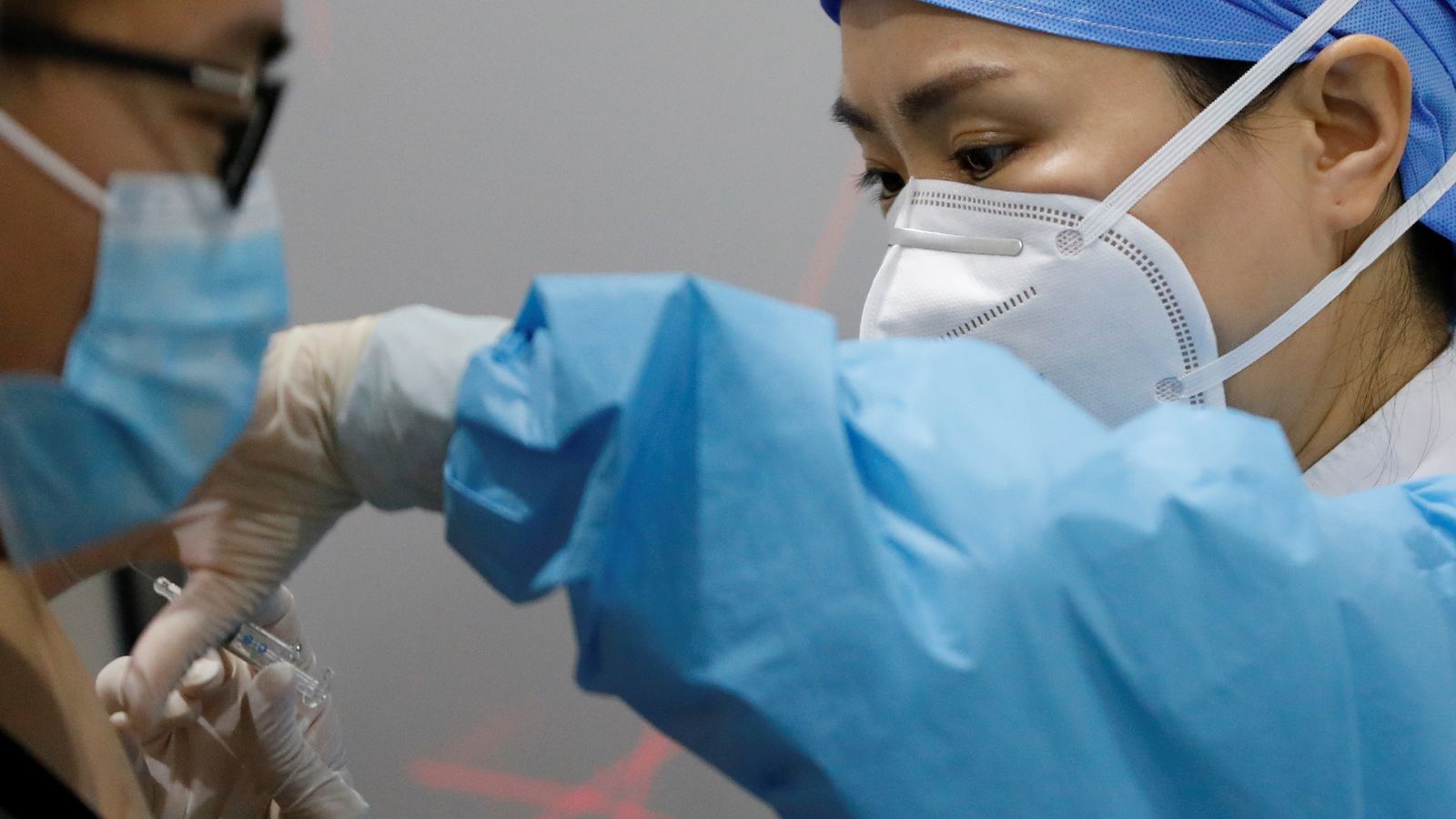In late March, major Chinese cities like Beijing and Shanghai started offering COVID-19 vaccines for foreigners. In this guide, we are going to answer common questions that you may have about COVID-19 vaccination for expats in China.
Frequently Asked Questions about COVID-19 Vaccination in China
1. What type of COVID-19 vaccine will be used?
Foreigners will receive two doses of Chinese-made COVID-19 vaccines such as Sinovac and Sinopharm. The recommended interval between the first and second dose is at least three weeks, and the second dose needs to be given within eight weeks.
These vaccines are made up of inactivated whole-virus SARS-CoV-2 vaccines, which prevent the COVID-19 virus from infecting and reproducing by using certain methods, and at the same time retain the activity that causes immune response within human body.
2. Who are eligible for COVID-19 vaccination?
Although there are priority groups in China, foreigners can still apply for vaccination as long they meet the following eligibilities:
- Foreign nationals aged 18 and older whose participation is voluntary.
- Willing to assume personal responsibility for the risks involved.

3. How can you get vaccinated in China?
Make an appointment for vaccination through your workplace or local/residential community offices and wait for your schedule.
Prepare your valid passport and residence permit ahead and bring the documents on the day of your vaccination. As directed by your district-level authorities, go to your appointed venue for vaccination.
During the day of vaccination, you will be asked to sign an informed consent detailing that you understand the risks involved and you will be responsible for any consequences of taking the vaccine.
After receiving the dose, you will be asked to remain at the vaccination site for 30 minutes in case of side effects. Check out this COVID-19 vaccination guide for Beijing here.
4. Is it necessary to get vaccinated?
To decrease your susceptibility to COVID-19, vaccination is necessary. Almost no one has the immunity against COVID-19 and vaccines are the most powerful weapon against the disease.
5. Are COVID-19 vaccines safe?
China follows strict control standards for the research and development of vaccines. From testing, approval to inoculation, the whole process undergoes stringent management.
Vaccination institutions and medical staff have received specialized training and have been strictly examined. The vaccination will be carried out according to standard procedures.
The efficacy of Chinese-made COVID-19 vaccines have met the requirements by the National Medical Products Administration, and the vaccines also met the preferred and minimally acceptable profiles specified in the WHO Target Product Profiles for COVID-19 Vaccines.
6. How much do COVID-19 vaccines in China cost?
Vaccination is free of charge for foreigners under the medical insurance scheme. You only need to show your insurance documents on the vaccine taking site. On the other hand, those who are not covered by the insurance have to pay 93.5 RMB per dose.
7. What are possible side effects of the vaccine?
The most common side effects of the COVID-19 vaccines reported are pain, induration or redness at the injection site, fatigue, and others include fever, headache, cough, anorexia, vomiting and diarrhea.
Should persistent high fever or discomfort occur, you should report to the vaccination institution and seek immediate medical help.
8. Can people aged over 60 and under 18 get vaccinated?
Based on the Technical Guideline for the Inoculation of COVID-19 Vaccines (First Edition), as phase I and II clinical data prove that the vaccine is safe for people aged above 60 and can provide some protection.
It is recommended that people aged above 60 be inoculated with the COVID-19 vaccine. Beijing has administered vaccines to some people aged above 60 who want to be vaccinated and are in good health.
Covid-19 vaccine is not recommended for People aged below 18 because of a lack of existing clinical data.
9. Who are not eligible to be vaccinated?
- Those who are allergic to the active ingredients of the vaccine.
- Those who had allergic reactions when vaccinated with the same kind of vaccine before.
- Those who have a known history of severe vaccine allergies such as acute allergic reaction, angioneurotic edema and dyspnea.
- Those who have epilepsy or other severe neurological diseases such as transverse myelitis, Guillain Barré syndrome and demyelinating diseases.
- Those who are having a fever, or have acute diseases, or are at acute stage of chronic diseases or have severe chronic diseases.
- Those who have unmanaged or uncontrolled health conditions, comorbidities and chronic diseases.
10. Are there any preparations before the vaccination?
Read relevant information about COVID-19 vaccines and how the vaccination process works. Prepare valid ID, passport, residence permit and insurance documents (if available) ahead and bring it during your vaccination appointment. It is also advisable to wear loose clothing during your vaccination.
11. Are there any food or activity restrictions after getting vaccinated?
Normal activities and diet will not affect the efficacy of the vaccine, and there is no need to change lifestyle.
12. Can people who recovered from COVID-19 get the vaccine?
According to the Technical Guideline for the Inoculation of COVID-19 Vaccinations (First Edition), those who had COVID-19 infection or asymptomatic infection can receive one dose of the vaccine 6 months after recovery.
13. Can women who want to get pregnant get the vaccine?
Preparation for pregnancy is not a contraindication to vaccination. Those who are preparing for pregnancy do not need to delay their plan due to COVID-19 vaccination.
14. Can breastfeeding mothers get vaccinated?
There is no clinical research data showing COVID-19 vaccines have impact on infants of breastfeeding mothers. It is recommended that lactating women at high risk of infection (such as medical staff) get vaccinated.
15. How can I get a vaccination certificate?
After getting two full doses of COVID-19 vaccine, the status “vaccination complete” will appear on your Health Kit app. You can then click “export or print proof” button at the bottom page and download the link. Copy and paste the link to your browser and download the electronic proof.
Read more COVID-19 updates here.
- Top 10 Ranked Chinese Universities - January 10, 2025
- China Scholarships – The 2025 Guide for International Students - December 30, 2024
- 9 Fascinating Things About Christmas In China - December 24, 2024
